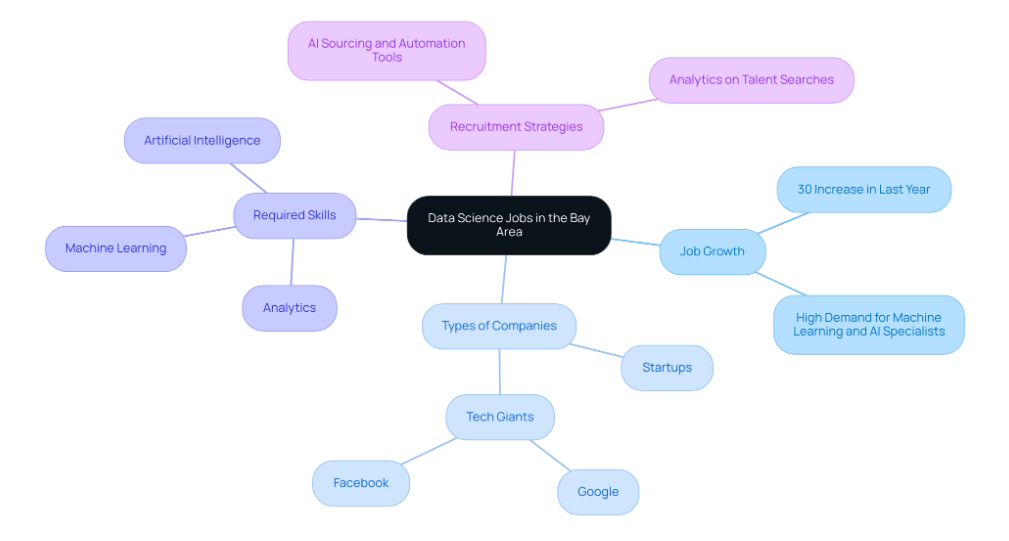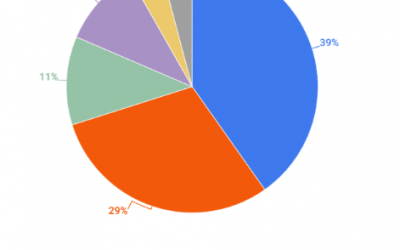In Silicon Valley, your resume gets you noticed — but your portfolio gets you hired.
If you’re trying to break into the data science scene in Silicon Valley, you already know it’s not easy. The competition is fierce, especially regarding landing roles at top-tier tech companies like Google, Meta, or Netflix. Everyone has the qualifications; what sets you apart is how you show what you can do. That’s where your portfolio comes in.
A strong data science portfolio isn’t just a collection of projects; it’s your proof of value. It’s what recruiters and hiring managers will look at to decide if you’re worth the interview.
In this guide, we’ll walk you through how to build a portfolio that not only highlights your technical skills but tells a clear, compelling story about what you bring to the table—especially in a market as demanding as the Bay Area.
Understanding the Bay Area Data Science Job Market
💡Here’s a visual snapshot of what’s driving the demand for data roles in the Bay Area—ranging from AI tools and analytics to startup growth and recruitment trends.

Source: Tech Needs
The San Francisco Bay Area isn’t just the birthplace of tech giants; it’s the epicenter of innovation, experimentation, and world-shaping ideas. That means a goldmine of opportunity for data professionals if you know how to stand out.
Over the past year alone, there’s been a 30% increase in demand for data and analytics roles across the Bay Area. Both startups and FAANG-level companies are investing more heavily in machine learning, AI, and data-driven decision-making. But while opportunities are growing, so is the competition.
To succeed here, having technical skills isn’t enough. You need to showcase your value in a way that’s clear, relevant, and actionable. That’s where your portfolio becomes your most powerful tool. It’s your story, your proof of ability, and your ticket to the interview table.
Here’s a breakdown of what the market looks like right now:
💡Bay Area roles seeing the fastest year-over-year job growth in 2024 — led by Data Engineers (+38%) and Machine Learning Engineers (+31%).
Key Components of a Standout Data Science Portfolio
Source: Techneeds
1- Diverse Project Showcase: Include projects that span various domains, such as machine learning, data visualization, and statistical analysis. This diversity illustrates your adaptability and comprehensive skill set.
2- Real-World Applications: Engage in projects that solve actual business problems or provide insights into real datasets. This approach demonstrates your ability to apply theoretical knowledge to practical scenarios.
3- End-to-End Solutions: Highlight projects where you’ve handled the entire data science pipeline—from data collection and cleaning to model deployment. This showcases your proficiency in managing complex workflows.
4- Collaborative Efforts: Participate in team projects or open-source contributions. Collaboration is highly valued in tech companies, and showcasing teamwork can set you apart.
5- Clear Documentation and Visualization: Ensure that each project is well-documented, with clear explanations of your methodologies and findings. Utilize visualizations to make your results more accessible and engaging.
Crafting Projects That Capture Attention
A strong portfolio is more than a list of completed tutorials; it’s a curated showcase of how you think, problem-solve, and build solutions that matter. In the highly competitive Silicon Valley data science job market, your projects need to do more than demonstrate technical proficiency; they need to show business impact, creativity, and an ability to communicate findings.
Whether you’re coming from a traditional background or transitioning through a data science bootcamp, the projects you include can make or break your chances at landing interviews with companies like Google, Meta, or emerging AI startups.
Here’s how to structure portfolio projects that stand out to hiring managers and recruiters from top tech companies:
Project Types That Impress Bay Area Recruiters
💡Below is a breakdown of portfolio project types that consistently catch the attention of hiring managers across the Bay Area tech ecosystem.
| Project Type | Description | Career Relevance |
|---|---|---|
| 📈 Predictive Analytics Models | Forecast trends like sales performance, churn rates, or market movements using historical data | Highly valued in finance, retail, and operations roles |
| 🗣️ NLP Applications | Analyze sentiment, detect spam, generate text summaries, or classify topics | Used in customer service, marketing, and product analysis |
| 🤖 Recommendation Systems | Personalize product/content suggestions based on user behavior and metadata | In demand in ecommerce, media, and SaaS industries |
| 📊 Data Visualization Dashboards | Build dashboards (e.g. Tableau, Power BI, Plotly Dash) to present data clearly | Key for analyst and BI-focused roles |
| 🧠 AI/ML Integrations | Apply ML models (classification, regression, clustering) in real-world applications | Crucial for ML engineer and data science roles |
At Magnimind, we’ve helped thousands of students transition into data roles with confidence. Based in Palo Alto, California, right in the heart of Silicon Valley, our data science courses are built around portfolio-first learning.
That means every student walks away not just with theory but with tangible projects that showcase their ability to think like a real-world data scientist.
Here’s what sets Magnimind apart:
| Feature | Description |
|---|---|
| Mentorship from Industry Experts. | Work one-on-one with data scientists and engineers from top tech companies. |
| Develop Real-Life Projects with Mentors | Apply your skills to real-world problems guided by experienced professionals. |
| Career-Focused Curriculum | Built around real hiring expectations—projects and skills that land interviews. |
| Mock Interviews with Tier-1 Pros | Practice and receive feedback from professionals at companies like Google, Meta, and more. |
| 30,000+ Member Community | One of the largest and most active data science communities in the Bay Area. |
Whether you’re switching careers or aiming to level up, our data science training equips you with the technical foundation and storytelling skills that top companies seek.
Leveraging the Silicon Valley Ecosystem
Being in the Bay Area provides unique opportunities to enhance your portfolio through networking and community engagement:
- Attend Meetups and Workshops: Participate in local data science meetups, hackathons, and workshops to stay abreast of industry trends and expand your professional network.
- Engage with Tech Communities: Join forums and online groups where you can collaborate on projects, share knowledge, and seek mentorship.
- Seek Feedback from Industry Professionals: Utilize platforms like LinkedIn to connect with experienced data scientists who can provide valuable critiques of your work.
Addressing Common Challenges
Many data professionals encounter obstacles such as:
- Intense Competition: Differentiate yourself by focusing on niche areas or emerging technologies within data science.
- FAANG Entry Barriers: Tailor your portfolio to reflect the specific skills and experiences that FAANG companies prioritize.
- Mentorship Gaps: Proactively seek mentors through professional associations or alumni networks to guide your career development.
- Continuous Learning: Dedicate time to upskilling and staying current with the latest tools, methodologies, and industry best practices.
Visualizing the Data Science Job Market
Source: nucamp
If you want your data science portfolio to land interviews—not just likes on GitHub—you need to align it with where the demand actually is.
Understanding the current job market isn’t just helpful; it’s critical to building a strategic portfolio that resonates with hiring managers in Silicon Valley.
Over the past year, the San Francisco Bay Area has seen a noticeable surge in data-driven roles, particularly in sectors like AI, cloud infrastructure, and business intelligence.
While data scientist roles remain highly coveted, there’s been a significant increase in demand for data analysts, data engineers, and machine learning specialists, especially in mid-size tech firms and fast-scaling startups.
| Role | Year-over-Year Growth | Key Employers Hiring | Hot Industries |
|---|---|---|---|
| Data Analyst | +34% | Salesforce, Uber, Airbnb | Marketing Analytics, Product Ops, Fintech |
| Data Engineer | +38% | Snowflake, Meta, Stripe | Cloud Services, AI Infrastructure |
| Data Scientist | +27% | Google, LinkedIn, NVIDIA | Research, Healthcare, Autonomous Systems |
| Machine Learning Engineer | +31% | OpenAI, Tesla, Netflix | NLP, Recommender Systems, Generative AI |
| BI Developer | +24% | Atlassian, Pinterest, Robinhood | SaaS Analytics, Finance, Customer Insights |
Ready to Get Noticed by Top Tech Companies?
Your portfolio is your ticket in. Make it speak louder than your resume.
- Learn what FAANG recruiters actually look for
- Get expert tips on structuring your projects
- Turn your GitHub into an interview magnet
“Magnimind helped me build a portfolio that finally got recruiters to respond. Two weeks later, I was interviewing at Meta and Airbnb.”
— Aisha, Data Analyst (Bay Area)
Breaking into top tech companies in Silicon Valley isn’t just about having technical skills—it’s about showcasing them through real, impactful projects. Your data science portfolio should tell a compelling story: one that solves real problems, reflects your versatility, and shows you’re committed to continuous learning.
Explore Our Career-Focused Programs
Whether you're starting out or looking to level up, choose the path that aligns with your goals.
Learn tools like SQL, Tableau and Python to solve business problems with data.
See Program OverviewBuild real projects, gain mentorship, and get interview-ready with real-world skills.
See Program Overview


